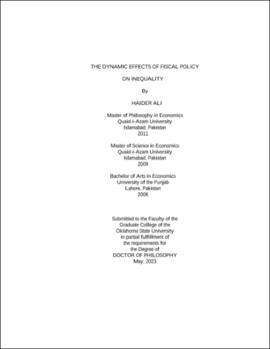| dc.contributor.advisor | Shen, Wenyi | |
| dc.contributor.author | Ali, Haider | |
| dc.date.accessioned | 2023-08-30T19:44:59Z | |
| dc.date.available | 2023-08-30T19:44:59Z | |
| dc.date.issued | 2023-05 | |
| dc.identifier.uri | https://hdl.handle.net/11244/338999 | |
| dc.description.abstract | My dissertation consists of two chapters and examines the linear and state-dependent (non-linear) effects of government spending shocks on various inequality measures. | |
| dc.description.abstract | The first chapter examines the dynamic effects of government spending shocks on income and consumption inequality in the United States. Using the recent quarterly micro-level US data on consumption and income estimated by the Consumer Expenditure Survey (CEX), this study analyzes the distributional effects of unanticipated changes in government spending on various economic inequalities considering different inequality measures. I do so by estimating the impulse response functions using the local projections method and utilizing forecasts of the fiscal variable by the Survey of Professional Forecasters for shock identification. Results show that income inequality to the unanticipated spending shock either remains unchanged or declines after five quarters. However, differing from the traditional view of a positive income-consumption inequality correlation, we find that fiscal shock significantly reduces consumption inequality despite any significant decrease in income inequality. Furthermore, results also suggest that the decrease in consumption inequality works through the interest rate channel since a fiscal policy shock significantly lowers interest-sensitive expenditures relative to non-durables. These results also support theoretical predictions of the heterogeneous agent model regarding the fiscal policy impact on inequality. | |
| dc.description.abstract | The second chapter investigates the state-dependent effects of unanticipated changes in government spending on consumption inequality using the Consumer Expenditure Survey (CEX). To do this, this study employs Jorda’s (2005) local projections method and estimates the impulse response functions of consumption inequality to a government spending shock. Using the unemployment rate as a state variable, this study also evaluates the transmission of fiscal policy to consumption inequality depending on whether government spending is increasing or decreasing, given the state of the economy. In line with the predictions of the New-Keynesian theoretical model, we find that government spending shocks are state-dependent, and fiscal consolidations are more effective in reducing consumption inequality when there is a high unemployment rate in the economy. | |
| dc.description.abstract | Overall, results suggest that government spending shocks effectively reduce consumption inequality, and contractionary spending shocks are more effective than expansionary ones during the slack state. | |
| dc.format | application/pdf | |
| dc.language | en_US | |
| dc.rights | Copyright is held by the author who has granted the Oklahoma State University Library the non-exclusive right to share this material in its institutional repository. Contact Digital Library Services at lib-dls@okstate.edu or 405-744-9161 for the permission policy on the use, reproduction or distribution of this material. | |
| dc.title | Dynamic effects of fiscal policy on inequality | |
| dc.contributor.committeeMember | Kim, Jaebeom | |
| dc.contributor.committeeMember | Du, Rui | |
| dc.contributor.committeeMember | Zhang, Jun. | |
| osu.filename | Ali_okstate_0664D_18092.pdf | |
| osu.accesstype | Open Access | |
| dc.type.genre | Dissertation | |
| dc.type.material | Text | |
| dc.subject.keywords | consumption inequality | |
| dc.subject.keywords | government spending | |
| dc.subject.keywords | income inequality | |
| dc.subject.keywords | state-dependent effects | |
| thesis.degree.discipline | Economics | |
| thesis.degree.grantor | Oklahoma State University | |
